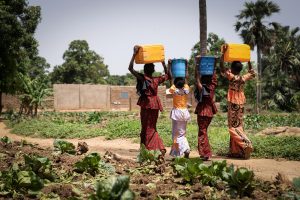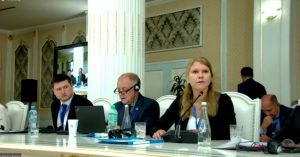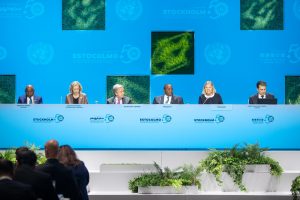A student’s reflection on the Urban Climate Change Adaptation Training in Stockholm
As a civil engineer from Spain greatly interested in water resources management, I decided to participate in the workshop for Urban Climate Change Adaptation tools at SIWI on November 28th. Climate change is a vital factor to consider while studying any environmental issue in any area, and a workshop regarding climate change adaptation tools seemed like the perfect seminar to attend as a hydrology student.
Coming from Spain, an area greatly affected by climate change surely triggered an interest in me to strive for a more sustainable environment. Rainfall episodes have become lesser in number and more intense, creating flooding events greater and more devastating. The ground is not capable of infiltrating enough groundwater to recharge aquifers and runoff is often not existent. Over the last few years, dam levels have been consistently decreasing compared to previous years and water stress is at a worrying level. Furthermore, due to an increase in temperature and evapotranspiration, lesser runoff has been present around the peninsula.
In my opinion, the most interesting part of the workshop was the different points of view of every participant in the seminar. From an academic perspective, there is a lot of uncertainty regarding water issues and thus we look for broad and more general mitigation measures. However, being surrounded by decision makers that have implemented measures resulting in efficient solutions provides hope to us students who aspire to deliver such remedies. Following a great explanation of CRIDA (Collaborative Risk Informed Decision Analysis), it seems as there are effective methods on how to achieve these solutions for the presented problems. However, it was made clear during the workshop that these models require more simplistic approaches for practitioners to implement them.
A few of the lessons I took from the seminar were how important is to collaborate with organizations and governments to achieve productive solutions regarding environmental issues, as well as how vital climate change adaptation measures are. We need to accept change is happening, but there are ways to adjust to these changes and improve or maintain these conditions, so it does not get worse. There was one controversial topic, in my opinion, which was the question: who is responsible when damages are produced and there is the need to fix them? From a point of view of a student, this question has not been asked enough and it really stuck with me.
Moreover, practitioners are in constant need to come up with updated solutions to issues that keep arising, thus seminars similar to the Urban Climate Change Adaptation training hosted by SIWI are exceptional methods to work towards effective answers. It is important that different stakeholders come together to bring awareness to the challenges they experience, while performing their practices in order to find alternatives to resolve them.
Predictions of climate change scenarios are based on likely assumptions along with great uncertainty. We can already see effects of climate change, so flexible adaptation measure to avoid a variety of risks should be implemented. Even though the infrastructure investments needed requires large resources to construct and implement, the stakes of not investing are too high to ignore.
Overall, this workshop was a great example of why collaboration between different organizations is vital in climate change adaptation. Even though there is a lot of uncertainty related to climate change effects and impact, there are tools and strategies available for decision makers and practitioners to minimize risks. In an ever-changing world, the best we can do is to improve our capability to adapt, even if it is to uncertainty.








